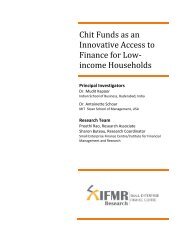Government of India Volume I: Analysis and Recommendations
Government of India Volume I: Analysis and Recommendations
Government of India Volume I: Analysis and Recommendations
Create successful ePaper yourself
Turn your PDF publications into a flip-book with our unique Google optimized e-Paper software.
SYSTEMIC RISK<br />
field <strong>of</strong> systemic risk, it is essential that system-wide measures are implemented on the<br />
scale <strong>of</strong> the financial system or a large part <strong>of</strong> the financial system. For example, raising<br />
capital requirements for the banking sector alone may lead to an increase in systemic<br />
risk relating to bank substitutes, or the non-banking sector, which may defeat the purpose<br />
<strong>of</strong> imposing the system-wide measure. For a system-wide measure such as capital<br />
requirements to matter on the scale <strong>of</strong> the entire financial system, the formulation <strong>and</strong><br />
operation <strong>of</strong> such measures would have to take place in a co-ordinated fashion.<br />
The fourth element requires promotion <strong>of</strong> inter-regulatory co-ordination amongst<br />
the member <strong>of</strong> the FSDC. Effective co-ordination across a wide range <strong>of</strong> policy areas<br />
is a key element <strong>of</strong> designing an appropriate institutional framework to monitor systemic<br />
risk. Since co-ordination is an inherent part <strong>of</strong> the FSDC’s work, the performance<br />
<strong>of</strong> this function may not be visible as a st<strong>and</strong> alone process with separate tangible goals.<br />
Nonetheless, the FSDC would focus on facilitating co-ordination which will aim to reduce<br />
regulatory uncertainty, thus promoting the overall coherence <strong>of</strong> the financial system.<br />
Finally, the fifth element involves assisting the Central <strong>Government</strong> with crisis management.<br />
In the event that any systemic crises occur, the draft Code emphasises a more<br />
formal <strong>and</strong> cohesive approach to crisis management. The Ministry <strong>of</strong> Finance, Central<br />
<strong>Government</strong> will lead the crisis management function, with assistance from the FSDC. The<br />
FSDC will also provide assistance to members <strong>and</strong> other agencies in their efforts to resolve<br />
the crisis.<br />
9.5. Constructing <strong>and</strong> analysing a system-wide database<br />
The process <strong>of</strong> systemic risk oversight begins with the gathering <strong>of</strong> information from all<br />
sectors <strong>of</strong> the financial system, collating the same <strong>and</strong> analysing it from the viewpoint<br />
<strong>of</strong> identifying system-wide trends which may be areas <strong>of</strong> concern. This requires interregulatory<br />
agency co-ordination, through which the data gathering, as well as discussion<br />
leads to informed decision making. The Commission envisages the construction <strong>of</strong> a unified<br />
database, located at the FSDC which will hold all data relating to the entire financial<br />
system.<br />
The FSDC will be a forum for the construction <strong>of</strong> a sophisticated database leading to<br />
the assimilation <strong>and</strong> transmission <strong>of</strong> system-wide financial data (Table 9.5). This database<br />
will serve to assist the FSDC in conducting research on systemic risk <strong>and</strong> system-wide<br />
trends, <strong>and</strong> facilitate a discussion about policy alternatives between the members <strong>of</strong> the<br />
FSDC. It will not have any power to give directions to financial regulatory agencies, which<br />
would be governed only by their respective legislation. The reporting requirements will<br />
be stipulated by the respective regulatory agency in relation to its respective financial<br />
entities. The latter will be required to route the data only through the FSDC’s database.<br />
All regulatory agencies will have instantaneous <strong>and</strong> continuous access to the data <strong>of</strong> financial<br />
entities which they regulate.<br />
Once this database is in place, <strong>and</strong> maintained regularly, the FSDC would conduct<br />
research, in co-operation with all regulatory institutions <strong>and</strong> with several academic institutions<br />
in order to analyse this data <strong>and</strong> identify potential systemic risks. These areas<br />
<strong>of</strong> concern would be brought up for discussion at the FSDC. Based on the consensus<br />
achieved at the FSDC, actions would be undertaken by all regulatory agencies in a coordinated<br />
fashion.<br />
Towards this end, the FSDC will operate a data centre called the Financial Data Management<br />
Centre (FDMC) that will obtain data from regulated entities <strong>and</strong> other financial<br />
firms. All supervisory information supplied by a regulated entity to any regulator will be<br />
routed through <strong>and</strong> held by this database; there will be no other physical or electronic<br />
FINANCIAL SECTOR LEGISLATIVE REFORMS COMMISSION 93



